Debra Brown's Blog, page 4
March 16, 2014
Soon to Release: The Second Chance by Joana Starnes
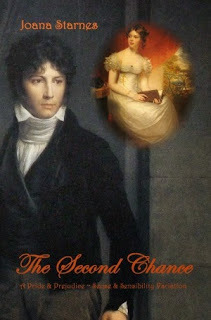 Soon after the Netherfield ball, a troubled Mr. Darcy decides to walk away from a most unsuitable fascination. Yet heartache is in store for them all, and his misguided attempts to ensure the comfort of the woman he loves backfire in ways he had not expected…
Soon after the Netherfield ball, a troubled Mr. Darcy decides to walk away from a most unsuitable fascination. Yet heartache is in store for them all, and his misguided attempts to ensure the comfort of the woman he loves backfire in ways he had not expected…Excerpt from the opening chapter:
Absentmindedly, Darcy returned his watch to its pocket and strolled down the corridor to the left side of the house, to the predictable sanctuary of his choice. The library would be deserted at this time in the morning. At any time of day, to be precise. For all his other virtues, Bingley was not an avid reader, and neither were his sisters, despite some vocal protestations to the contrary – which, in truth, suited him very well indeed.He opened the panelled door and entered, closing it quietly behind him. ‘Sparse’ would be the kindest way to describe Bingley’s collection, and Darcy wondered what he could choose today. He slowly ambled in, aiming for the furthest shelves where, a few days earlier, he had found a tome about some intrepid explorers and their perilous travels to the far-flung reaches of the Orient – and suddenly stopped, frozen in his tracks. The library was not deserted at that time in the morning. Previously hidden by the high back of the sofa she reclined upon, the occupant was now revealed to him, and Darcy all but gasped. A book loosely resting in her lap, her thumb still keeping her place between the pages, Miss Elizabeth Bennet sat before him, oblivious to his presence – and for a moment Darcy contemplated the wisdom of a swift retreat. But nay, she was bound to notice his withdrawal, and deliberate discourtesy was not something Darcy had ever wished to cultivate – except towards those who clearly deserved it. He drew breath to greet her – but, as his slow footsteps brought him at last in full view of her countenance, the civil words faded on his lips. She was asleep. She must have come down in the early hours of the morning for a brief respite, after tending to her sister for the best part of the night, and tiredness must have overcome her as she had read her book. It forcefully struck him that, for the very first time in their acquaintance, he did not have to swiftly look away for fear that she would notice he was staring, and the unhoped-for chance to take in every detail of her appearance rose to his head, with all the heady effects of a fine wine. Beautiful? He had taken great pains to make it clear to himself and to his friends – impudent dog that he was! – that she hardly had a good feature in her face. Yet he had scarce persuaded himself of the fact before that very face began to draw him, with the beautiful expression of her eyes, with every play of genuine emotion over the less-than-classically-perfect features, with every smile for her eldest sister, with every arch look towards him.Whether she was beautiful or not to other eyes no longer mattered. It was she who drew him, more than any reputed beauty. Her warmth, her artless charm, her smile. She was smiling now, her lips ever so slightly turned up at the corners, ever so slightly parted, allowing quiet, tranquil breaths, softly in, softly out.Her nose – small and endearingly perfect. The stubborn little chin, often tilted up in a playful show of defiance, the latest instance no further than the previous night.‘I have therefore made up my mind to tell you that I do not want to dance a reel at all – and now despise me if you dare!’ He smiled despite himself as he remembered, the delightful mixture of archness and sweetness in her manner bewitching him more than anything he had ever come across.She had very long lashes, he suddenly observed. He had never noticed this before, too mesmerised by the mirth in her eyes to pay any heed to something as mundane as lashes. They were thick, dark, and curled up at the ends. Her head was tilted to one side and the auburn ringlets that framed the oval face were now in disarray – she obviously intended to slip out for a moment from her sister’s chambers, and had not readied herself for anybody’s company, and certainly not his. He ought to leave – that, he knew full well. He ought to turn on his heels and leave her before the lashes fluttered, her eyes opened and she caught him in the unpardonable act of spying on her in her sleep – and yet he could not, would not step away. It took all the restraint he still possessed to not drop to one knee by her side and reach to brush his fingertips against the rosy cheek. He slowly flexed his unruly fingers into a tight fist, one by one, pressing his thumb against them in forceful endeavour to ensure that he would not succumb to the inconceivable temptation – yet even then, in defiance of his strict control, tantalising thoughts began to weave ever so slowly through him, spreading subtle, delicious poison in their wake.To have the right to do so! To have the right to reach and caress her cheek, as she would lay asleep in his bed beside him. To see her eyes flutter open and crinkle at the corners as she would smile at him. To be allowed – encouraged – to lean towards her and taste the sweetness of her lips, to feel them soft and pliant beneath his own, as he would take her in his arms, her warm, lovely form cradled to his chest. Tender. Loving. Beautiful. His.He swallowed hard, his mouth suddenly dry and drew a ragged breath, so loud to his own ears that he feared it would wake her. She did not wake and, mindless of the dangers of exposure, he still stood exactly where he was, drinking in the sight of her and recklessly courting disaster. If she should wake, this very moment…Seconds passed, one… two… three… a number. And every shred of reason cried out at him to leave, no longer merely to avoid detection and the attendant mortification, but to preserve himself from an enchanting vision that would most likely haunt him from now on in all his sleepless nights… At long last he obeyed and walked back to the door, on mercifully sturdy floorboards. The hinges did not creak, another mercy, and he noiselessly closed the heavy door behind him – just as the thud of a book falling to the floor could be heard from the room that he had quitted.Darcy took his hand off the door-handle as though the intricately moulded metal burned and, exhaling in sudden gratitude at his own narrow, far too narrow escape, he hastened away from the blasted spot – and from the strongest of temptations.
You can read more at:http://www.joanastarnes.co.uk/1/post/2014/03/coming-soon-the-second-chance-a-pride-prejudice-sense-sensibility-variation.html
‘The Second Chance’ will soon be available at Amazon and Smashwords.
Thank you for reading my blog! I am always eager to hear back from you.
Debbie Brown
Author of The Companion of Lady Holmeshire
Published on March 16, 2014 21:55
March 6, 2014
New Release: 'Serpents in the Garden' by Anna Belfrage
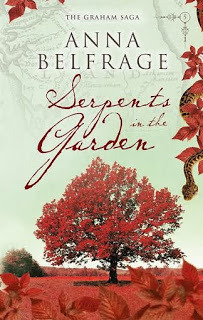 After years of hard work, Matthew and Alex Graham have created a thriving home in the Colony of Maryland. About time, in Alex’s opinion, after far too many adventures she is really looking
After years of hard work, Matthew and Alex Graham have created a thriving home in the Colony of Maryland. About time, in Alex’s opinion, after far too many adventures she is really looking forward to some well-deserved peace and quiet.
A futile hope, as it turns out. Things start to heat up when Jacob, the third Graham son, absconds from his apprenticeship to see the world – especially as Jacob leaves behind a girl whom he has wed in a most irregular fashion. Then there’s the infected matter of the fellow time traveller Alex feels obliged to help – no matter the risk. Worst of all, one day Philip Burley and his brothers resurface after years of absence. As determined as ever to make Matthew pay for every perceived wrong – starting with the death of their youngest brother – the Burleys play out a complicated cat and mouse game, and Alex is thrown back into an existence where her heart is constantly in her mouth, convinced as she is that one day the Burleys will achieve their purpose.
Will the Burleys succeed? And if they do, will the Graham family survive the exacted price?
Serpents in the Garden is the fifth book in Anna Belfrage’s time slip series featuring time traveller Alexandra Lind and her seventeenth century husband, Matthew Graham.
Excerpt
“A word, Brother Matthew?”
Matthew sighed when he recognised the voice, but stopped all the same, sending an admonishing look at his wife.
“Mr Farrell,” he said, inclining his head in a polite greeting. Beside him, Alex curtsied.
Mr Farrell nodded curtly. “And how is your wife today?”
“As you can see, she is well.”
“Hmm.” Mr Farrell twirled his cane, his normally rather fleshy mouth set into a displeased gash. “I find it too coincidental,” he blurted.
“What?”
“Don’t give me that, Brother Matthew. You know full well what I’m referring to. First, your wife is found talking to my slave. Come night, said slave escapes. Mighty strange that: a man chained to a pole contrives not only to strike the chains off, but also succeeds in creating a hole through a stout plank wall – with no tools but his hands.”
“Aye.” Matthew nodded. “That is right strange, that is.”
“He had an accomplice,” Mr Farrell said. “How else explain it.”
“An accomplice? Another slave, you think?”
“No, Brother Matthew, I think not. I think your wife.”
“My wife?” Matthew pulled his brows together into a ferocious scowl. “What makes you say such?”
Mr Farrell took a step or two back. “I hold you in the highest regard, Brother Matthew, and never would I utter such an accusation lightly. But, as I said, I don’t believe in coincidences. On the same night my rebellious slave escapes, your wife is apparently sleepwalking through our settlement, and in the process she not only tore her clothes, but somehow mangled her hands.”
“I do that a lot when I sleepwalk,” Alex put in, “tear my clothes, I mean. I fall over.”
Matthew glared her silent. “I can assure you, my wife it was not, and I’d gladly take on anyone who says differently.”
“We’ll see.” Mr Farrell adjusted his hat. “I dare say he’ll tell us the truth – ultimately. There is only so much pain a man can bear.”
“The word of a slave counts for nothing,” Matthew said, but his heart was thronging his throat, and out of the corner of his eye, he could see Alex had gone very still.
“Interesting all the same.” Mr Farrell looked Matthew straight in the eye. “I expect you to be present at his punishment so you can hear first-hand what he has to say.”
“His punishment?” Alex said. “How can you even think of punishing him? He looked close to death this morning!”
“That slave has to be taught a lesson,” Mr Farrell said, “and, once I’m done with him, he’ll be as docile as a lapdog.”
“He’s not a dog, he’s a man,” Alex flared.
“He’s a slave, Mrs Graham, a disobedient, difficult slave.” Mr Farrell gave her a crooked little smile. “And why should you care? Unless, of course, it was you that helped him.”
Alex went a bright pink. “I most certainly didn’t!” She sounded insulted rather than guilty. “That doesn’t mean I can’t feel sorry for him.”
“Most inappropriate,” Mr Farrell said severely before turning away.
“Shit,” Alex muttered to his retreating back. She cleared her throat. “Maybe we should leave, now.”
“How would that help?” Matthew said. “No, we have to brazen it out, no matter what yon poor bastard says.”
Amazon US
Amazon UK
Thank you for reading my blog! I am always eager to hear back from you.
Debbie Brown
Author of The Companion of Lady Holmeshire
Published on March 06, 2014 09:51
February 15, 2014
A Truth Stranger than Fiction – Samuel Foote
Guest post by Grace Elliot
'Truth is Stranger than Fiction’
This saying is never truer than for the 18th century wit, actor and mimic, Samuel Foote. Mr Foote’s claims to Georgian fame include establishing the Haymarket theatre, playing transvestite roles, turning a family murder into a bestselling book, flouting licensing laws and writing a string of plays for one-legged actors. Indeed, truth being stranger than fiction it is extraordinary that Mr Foote (his real name) lost a leg when a practical joke went wrong and then used his disability to strive for even greater fame.
As a young man Foote trained as a lawyer but his heart wasn’t in it. A short man with a big personality, Foote’s lifestyle outstripped his financial means and he ended up in debtors jail. Evidently a resourceful man, he paid of his debts with earnings from a book he wrote. His bestselling ‘Genuine Account’ utilized the notoriety of his own uncle who was convicted and hung for the murder of his brother. This bestseller gained Foote celebrity status and he started to mix in London’s creative circles.
Foote frequented the same coffee houses as a young David Garrick, Henry Fielding and Samuel Johnson, as well as other influential Londoners. A measure of his wit was that in one coffee house a pinch of snuff was awarded to the man who told the wittiest quip or told a tale well – this ‘snuff of glory’ was soon Foote’s regular prize. As time went on Sam Foote edged further away from a career in law and towards the stage.
Foote took acting lessons and his first roles were in ‘unlicensed’ productions. The government of the day had recently created the Licensing Act of 1737 which forbad the performance of plays not approved by the Lord Chamberlain. This came about in response to plays poking fun at politicians, essentially a form of censorship the act muzzled wits and satirist, and productions reverted to softer, more sentimental pieces. However, the publics’ thirst for biting satire went unquenched – enter Sam Foote.
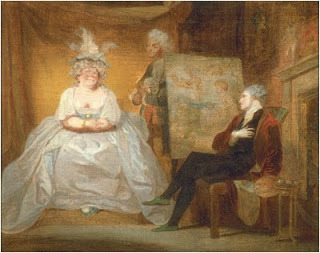 Samuel Foote as Lady Pentweazel
Samuel Foote as Lady Pentweazel
in a play he wrote titled ‘Taste’.By 1747 Foote was writing and acting, and put on a play called ‘A Dish of Chocolate’. The chocolate referred to in the title was the beverage the visitor paid for at the door – the entertainment being gratis –and therefore not invoking the licensing act. His ‘Tea Party’ performances became hugely popular, filling a gap in the market for comedy and satire, and Foote’s place on the London stage was assured. Apparently, Benjamin Franklin was a fan and on a trip to London had dinner with Foote. They had an evening of banter of which this remark by Franklin was noted down by Foote:
“Any boy who is good at excuses, is generally good for nothing else.”
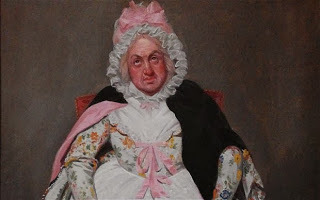 An actor playing the part of Mrs Cook
An actor playing the part of Mrs Cook
written by Samuel FooteFoote lead a full life which is difficult to compress into a short piece, so let us move swiftly on to one of the defining moments of his life – losing a leg. Foote was invited to a country house gathering in Yorkshire hosted by Lady Mexborough. Other guests included the Duke of York, and perhaps Foote felt intimidated because he was quoted as having said:
“He could ride a horse as well as most men he knew”, even though he was a poor rider. The aristocrats, for whatever reason, decided to challenge this comment and challenged Foote to ride any horse in the stables. He accepted (no doubt to save face) but instead of a placid mount, for a joke the Duke gave Foote his own, flightly, mettlesome horse. Foote was thrown instantaneously and in the fall, sustained two compound fractures that necessitated his leg to be amputated.
However, Foote lost a limb, not his head and when the Duke expressed concern that Foote should not suffer poverty as a result, Foote made a canny suggestion.
“I took the liberty to mention to His Royal Highness that a patent from the Crown for the House in the Haymarket during my lifetime would protect me from want…”
The repentant Duke duly issued Foote with a charter to hold a patent for the new theatre in Haymarket – and the Theatre Royal was born – pretty much a license for Foote to print money.

Foote longed to perform again and so was fitted with a special jointed, artificial leg. He used his disability to reinvent himself, and wrote parts for one legged actors – such as Luke Lame in The Lame Lover. Another, more controversial play was The Devil Upon Two Sticks which personified the devil as a doctor. Foote became a wealthy man but work lead to exhaustion and …ultimately, all did not end well for Foote, but to tell is another story – but needless to say, truth is stranger than fiction.
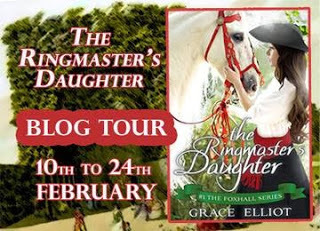
~~~~~~~~~~~~~
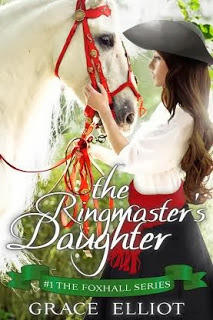 The Ringmaster’s Daughter
The Ringmaster’s Daughter
1770’s London
The ringmaster’s daughter, Henrietta Hart, was born and raised around the stables of Foxhall Gardens. Now her father is gravely ill, and their livelihood in danger. The Harts' only hope is to convince Foxhall’s new manager, Mr Wolfson, to let Hetty wield the ringmaster’s whip. Hetty finds herself drawn to the arrogant Wolfson but, despite their mutual attraction, he gives her an ultimatum: entertain as never before – or leave Foxhall.
When the winsome Hetty defies society and performs in breeches, Wolfson’s stony heart is in danger. Loath as he is to admit it, Hetty has a way with horses…and men. Her audacity and determination awaken emotions long since suppressed.
But Hetty’s success in the ring threatens her future when she attracts the eye of the lascivious Lord Fordyce. The duke is determined, by fair means or foul, to possess Hetty as his mistress – and, as Wolfson’s feelings for Henrietta grow, disaster looms.
Buy Links
Amazon US
Amazon UK
Social Media Links
Subscribe to Grace’s quarterly newsletter.
Grace’s blog ‘Fall in Love With History’
Website
Grace on Twitter
Goodreads
Grace’s author page on Amazon
Facebook
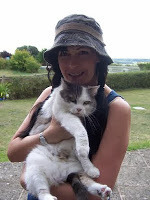 Grace Elliot leads a double life as a veterinarian by day and author of historical romance by night. Grace lives near London and is housekeeping staff to five cats, two teenage sons, one husband and a bearded dragon.
Grace Elliot leads a double life as a veterinarian by day and author of historical romance by night. Grace lives near London and is housekeeping staff to five cats, two teenage sons, one husband and a bearded dragon.
Grace believes that everyone needs romance in their lives as an antidote to the modern world. The Ringmaster’s Daughter is Grace’s fifth novel, and the first in a new series of Georgian romances.
Thank you for reading my blog! I am always eager to hear back from you.
Debbie Brown
Author of The Companion of Lady Holmeshire
'Truth is Stranger than Fiction’
This saying is never truer than for the 18th century wit, actor and mimic, Samuel Foote. Mr Foote’s claims to Georgian fame include establishing the Haymarket theatre, playing transvestite roles, turning a family murder into a bestselling book, flouting licensing laws and writing a string of plays for one-legged actors. Indeed, truth being stranger than fiction it is extraordinary that Mr Foote (his real name) lost a leg when a practical joke went wrong and then used his disability to strive for even greater fame.
As a young man Foote trained as a lawyer but his heart wasn’t in it. A short man with a big personality, Foote’s lifestyle outstripped his financial means and he ended up in debtors jail. Evidently a resourceful man, he paid of his debts with earnings from a book he wrote. His bestselling ‘Genuine Account’ utilized the notoriety of his own uncle who was convicted and hung for the murder of his brother. This bestseller gained Foote celebrity status and he started to mix in London’s creative circles.
Foote frequented the same coffee houses as a young David Garrick, Henry Fielding and Samuel Johnson, as well as other influential Londoners. A measure of his wit was that in one coffee house a pinch of snuff was awarded to the man who told the wittiest quip or told a tale well – this ‘snuff of glory’ was soon Foote’s regular prize. As time went on Sam Foote edged further away from a career in law and towards the stage.
Foote took acting lessons and his first roles were in ‘unlicensed’ productions. The government of the day had recently created the Licensing Act of 1737 which forbad the performance of plays not approved by the Lord Chamberlain. This came about in response to plays poking fun at politicians, essentially a form of censorship the act muzzled wits and satirist, and productions reverted to softer, more sentimental pieces. However, the publics’ thirst for biting satire went unquenched – enter Sam Foote.
 Samuel Foote as Lady Pentweazel
Samuel Foote as Lady Pentweazel in a play he wrote titled ‘Taste’.By 1747 Foote was writing and acting, and put on a play called ‘A Dish of Chocolate’. The chocolate referred to in the title was the beverage the visitor paid for at the door – the entertainment being gratis –and therefore not invoking the licensing act. His ‘Tea Party’ performances became hugely popular, filling a gap in the market for comedy and satire, and Foote’s place on the London stage was assured. Apparently, Benjamin Franklin was a fan and on a trip to London had dinner with Foote. They had an evening of banter of which this remark by Franklin was noted down by Foote:
“Any boy who is good at excuses, is generally good for nothing else.”
 An actor playing the part of Mrs Cook
An actor playing the part of Mrs Cook written by Samuel FooteFoote lead a full life which is difficult to compress into a short piece, so let us move swiftly on to one of the defining moments of his life – losing a leg. Foote was invited to a country house gathering in Yorkshire hosted by Lady Mexborough. Other guests included the Duke of York, and perhaps Foote felt intimidated because he was quoted as having said:
“He could ride a horse as well as most men he knew”, even though he was a poor rider. The aristocrats, for whatever reason, decided to challenge this comment and challenged Foote to ride any horse in the stables. He accepted (no doubt to save face) but instead of a placid mount, for a joke the Duke gave Foote his own, flightly, mettlesome horse. Foote was thrown instantaneously and in the fall, sustained two compound fractures that necessitated his leg to be amputated.
However, Foote lost a limb, not his head and when the Duke expressed concern that Foote should not suffer poverty as a result, Foote made a canny suggestion.
“I took the liberty to mention to His Royal Highness that a patent from the Crown for the House in the Haymarket during my lifetime would protect me from want…”
The repentant Duke duly issued Foote with a charter to hold a patent for the new theatre in Haymarket – and the Theatre Royal was born – pretty much a license for Foote to print money.

Foote longed to perform again and so was fitted with a special jointed, artificial leg. He used his disability to reinvent himself, and wrote parts for one legged actors – such as Luke Lame in The Lame Lover. Another, more controversial play was The Devil Upon Two Sticks which personified the devil as a doctor. Foote became a wealthy man but work lead to exhaustion and …ultimately, all did not end well for Foote, but to tell is another story – but needless to say, truth is stranger than fiction.

~~~~~~~~~~~~~
 The Ringmaster’s Daughter
The Ringmaster’s Daughter1770’s London
The ringmaster’s daughter, Henrietta Hart, was born and raised around the stables of Foxhall Gardens. Now her father is gravely ill, and their livelihood in danger. The Harts' only hope is to convince Foxhall’s new manager, Mr Wolfson, to let Hetty wield the ringmaster’s whip. Hetty finds herself drawn to the arrogant Wolfson but, despite their mutual attraction, he gives her an ultimatum: entertain as never before – or leave Foxhall.
When the winsome Hetty defies society and performs in breeches, Wolfson’s stony heart is in danger. Loath as he is to admit it, Hetty has a way with horses…and men. Her audacity and determination awaken emotions long since suppressed.
But Hetty’s success in the ring threatens her future when she attracts the eye of the lascivious Lord Fordyce. The duke is determined, by fair means or foul, to possess Hetty as his mistress – and, as Wolfson’s feelings for Henrietta grow, disaster looms.
Buy Links
Amazon US
Amazon UK
Social Media Links
Subscribe to Grace’s quarterly newsletter.
Grace’s blog ‘Fall in Love With History’
Website
Grace on Twitter
Goodreads
Grace’s author page on Amazon
 Grace Elliot leads a double life as a veterinarian by day and author of historical romance by night. Grace lives near London and is housekeeping staff to five cats, two teenage sons, one husband and a bearded dragon.
Grace Elliot leads a double life as a veterinarian by day and author of historical romance by night. Grace lives near London and is housekeeping staff to five cats, two teenage sons, one husband and a bearded dragon. Grace believes that everyone needs romance in their lives as an antidote to the modern world. The Ringmaster’s Daughter is Grace’s fifth novel, and the first in a new series of Georgian romances.
Thank you for reading my blog! I am always eager to hear back from you.
Debbie Brown
Author of The Companion of Lady Holmeshire
Published on February 15, 2014 00:00
February 5, 2014
#Regency Ladies’ Accomplishments
by Maria Grace
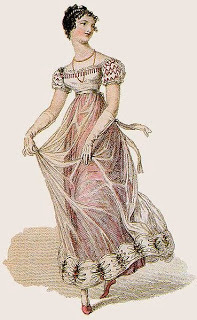 During the Regency era, a proper education was crucial to a middle or upper class young lady’s future. Since a woman’s only ‘proper’ aspiration was to marriage, her education focused on making her noticeable to potential husbands. Her accomplishments enabled her to display cultural distinction and set herself apart from women who were merely ‘notable’—those who could only manage a household but not cultivate elegant socializing.
During the Regency era, a proper education was crucial to a middle or upper class young lady’s future. Since a woman’s only ‘proper’ aspiration was to marriage, her education focused on making her noticeable to potential husbands. Her accomplishments enabled her to display cultural distinction and set herself apart from women who were merely ‘notable’—those who could only manage a household but not cultivate elegant socializing.
The number of accomplishments a young lady acquired reflected the financial state of her family and the level of sacrifice they were willing to make to improve her chances of marrying well.
Men of the middle and upper classes sought a wife who would be a social asset to them (in addition to a good dowry of course.) Being a "social asset" meant being somewhere between ignorant and illiterate and an intellectual. She could never be an intellectual threat to her husband, but should be able to follow conversation, and perhaps more importantly keep a conversation away from unpleasantries and steered toward good humor for all.
Certain subjects were considered necessary for becoming that desired social asset. These included:
Reading
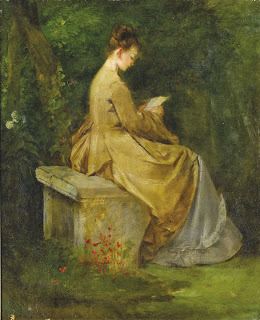 No young woman could be considered accomplished without the ability to read. Not only was it necessary for basic household management and correspondence, but it formed a foundation for intelligent conversation and for reading aloud for the entertainment of others.
No young woman could be considered accomplished without the ability to read. Not only was it necessary for basic household management and correspondence, but it formed a foundation for intelligent conversation and for reading aloud for the entertainment of others.
Though young ladies were not encouraged to read heavy subjects like philosophy and theology, serious books were considered appropriate as they enabled interesting conversation. Similarly, scripture to enable her to recognize passages and sermons, such as Fordyce’s, aimed at young women, were appropriate reading for an accomplished lady.
Writing
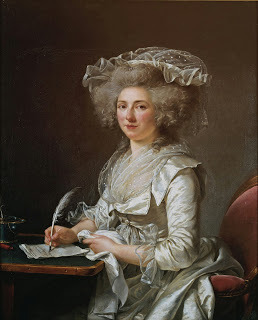 In this context, writing did not refer to a creative endeavor, but rather being able to create a letter with beautiful penmanship, correctly spelled and with excellent grammar. Young women would be schooled in the art of letter writing, with books dedicated to the topic offering examples of good letters for her to emulate.
In this context, writing did not refer to a creative endeavor, but rather being able to create a letter with beautiful penmanship, correctly spelled and with excellent grammar. Young women would be schooled in the art of letter writing, with books dedicated to the topic offering examples of good letters for her to emulate.
Arithmetic
No mistress could run a household or estate without a solid understanding of basic math. She had to be able to keep accounts, balance a budget, calculate how much food and others supplies needed to be bought, track expenses and even forecast trends in the use of supplies.
Few women would have exposure to advanced algebra or other pure mathematics. She had no practical use for them and would be dangerously close to challenging her husband’s expertise if she knew them.
Sciences and Social sciences
The natural sciences and social sciences were significant to young ladies only insofar as they facilitated the art of refined conversation. General awareness and rote memorization in areas of history, politics, geography, literature and philosophy were sufficient for ladies of quality.
A cursory knowledge of botany was common. Ladies who were more interested might also become learned in the use of plants as home remedies since the mistress of an estate was often the first one consulted in cases of injury and illness.
Languages
Despite the Napoleonic wars, a working knowledge of French was indispensable for a young lady. Italian and German, for singing and understanding sung performances were also useful, but conversational fluency was not expected. Greek and Latin, beyond a handful of commonly used phrases were the purview of men and not included in a young lady’s curriculum.
Music
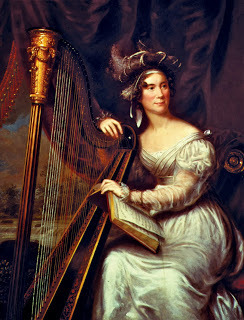 Though not expected to be virtuosos, quality young ladies were expected to be proficient musicians. Playing and singing were considered seductive to men since they displayed her body and bearing to potential suitors. Furthermore, once married, musical skills would be useful for long evening of entertaining both her husband and her guests.
Though not expected to be virtuosos, quality young ladies were expected to be proficient musicians. Playing and singing were considered seductive to men since they displayed her body and bearing to potential suitors. Furthermore, once married, musical skills would be useful for long evening of entertaining both her husband and her guests.
Only a few instruments were considered appropriate for young ladies. Anything which needed to be blown into was a risk for causing a reddened face and heaving bosom, neither of which would be attractive, much less alluring, so they were out of the question. The violin, which required raised arms, was also inappropriate. The short bodied dresses of the era presented too many possibilities for embarrassing mishaps. Moreover, the violin required a higher level of expertise to perform and the potential for embarrassing oneself was higher.
The harp was the most desirable instrument, but most had to make do with the piano which had replaced the harpsichord in popularity. Some young ladies also learned the guitar.
Not only did girls need to be able to play and sing, but they had to be able to dance. The dance floor was the place for young ladies to interact with their suitors, a place where they could escape the watchful eyes of their chaperones and engage in somewhat private conversation and even touch, which was otherwise entirely forbidden. Skilled and graceful partners were highly desirable. Girls who danced poorly could expect to spend a lot of time without a partner.
Artistic endeavors
Girls were encouraged to draw and paint and given training in it whenever possible. Particularly talented girls might even exhibit their work at local or national levels, or teach other girls, all of which could be valuable if she failed to obtain a husband.
Filigree work, now known as quilling, and japanning, now called decoupage, were also encouraged as ways for ladies to display their artistic skills. Screens, small chests and trunks and various bric-a-brac were frequently the object of their efforts.
Needlework (plain and fancy)
Needlework was one of the most practical subjects for a young lady. No matter what her future might hold, clothing, plain or elegant, would be a part of it. Clothing required mending and making. Even ladies who could hire out their own sewing would often engage in making garments for charitable cases in their parish. Fancy work included embroidery, cross stitch, knotting, netting and more.
Needlework need not be a solitary endeavor. Often, women would bring along their work baskets during social calls and work as they visited. If someone arrived without something to work on, a hostess might offer something from her workbasket to her visitor. Of course, the elegance of the project would reflect upon the seamstress and fancy projects were more desirable for working in company than plain.
All these accomplishments might be acquired in a variety of ways, depending on the accomplishments of a girl’s mother and the means of her family. Her education would begin at home, conducted or at least supervised by her mother. If a family’s situation allowed, a governess might be hired or teaching masters brought in for specialized subjects like music and dance. Families of better means might send their daughters for a year or two to boarding school to ‘finish’ a young lady’s accomplishments.
Armed with these skills, a young woman would be considered ready to enter society and engage in the all-important task of finding a suitable husband.
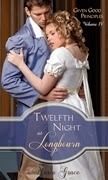
References
Baird, Rosemary. Mistress of the House, Great Ladies and Grand Houses. Phoenix (2003)
Collins, Irene . Jane Austen, The Parson's Daughter Hambledon (1998)
Collins, Irene . Jane Austen & the Clergy The Hambledon Press (2002)
Davidoff, Leonore & Hall, Catherine. Family Fortunes: Men and Women of the English Middle Class 1780-1850 Routledge (2002)
The Female Preceptor. Essays On The Duties Of The Female Sex, Conducted By A Lady. 1813 and 1814
Fullerton, Susannah. Jane Austen &Crime JASA Press (2004)
Harvey, A. D. Sex in Georgian England Phoenix Press (1994)
Jones, Hazel. Jane Austen & Marriage Continuum Books (2009)
Lane, Maggie. Jane Austen's World Carlton Books (2005)
Laudermilk, Sharon & Hamlin, Teresa L. The Regency Companion Garland Publishing (1989)
Le Faye, Deirdre. Jane Austen: The World of Her Novels Harry N. Abrams (2002)
Martin, Joanna. Wives and Daughters Hambledon Continuum (2004
Selwyn, David. Jane Austen & Leisure The Hambledon Press (1999)
Sullivan, Margaret C. The Jane Austen Handbook Quirk Books (2007)
Watkins, Susan. Jane Austen's Town and Country Style Rizzoli (1990)
~~~~~~~~~~~~~
 Though Maria Grace has been writing fiction since she was ten years old, those early efforts happily reside in a file drawer and are unlikely to see the light of day again, for which many are grateful.
Though Maria Grace has been writing fiction since she was ten years old, those early efforts happily reside in a file drawer and are unlikely to see the light of day again, for which many are grateful.
She has one husband, two graduate degrees and two black belts, three sons, four undergraduate majors, five nieces, six cats, seven Regency-era fiction projects and notes for eight more writing projects in progress. To round out the list, she cooks for nine in order to accommodate the growing boys and usually makes ten meals at a time so she only cooks twice a month.
She can be contacted at:
Email
Facebook
On Amazon
Visit her website Random Bits of Fascination
On Twitter
Thank you for reading my blog! I am always eager to hear back from you.
Debbie Brown
Author of The Companion of Lady Holmeshire
 During the Regency era, a proper education was crucial to a middle or upper class young lady’s future. Since a woman’s only ‘proper’ aspiration was to marriage, her education focused on making her noticeable to potential husbands. Her accomplishments enabled her to display cultural distinction and set herself apart from women who were merely ‘notable’—those who could only manage a household but not cultivate elegant socializing.
During the Regency era, a proper education was crucial to a middle or upper class young lady’s future. Since a woman’s only ‘proper’ aspiration was to marriage, her education focused on making her noticeable to potential husbands. Her accomplishments enabled her to display cultural distinction and set herself apart from women who were merely ‘notable’—those who could only manage a household but not cultivate elegant socializing. The number of accomplishments a young lady acquired reflected the financial state of her family and the level of sacrifice they were willing to make to improve her chances of marrying well.
Men of the middle and upper classes sought a wife who would be a social asset to them (in addition to a good dowry of course.) Being a "social asset" meant being somewhere between ignorant and illiterate and an intellectual. She could never be an intellectual threat to her husband, but should be able to follow conversation, and perhaps more importantly keep a conversation away from unpleasantries and steered toward good humor for all.
Certain subjects were considered necessary for becoming that desired social asset. These included:
Reading
 No young woman could be considered accomplished without the ability to read. Not only was it necessary for basic household management and correspondence, but it formed a foundation for intelligent conversation and for reading aloud for the entertainment of others.
No young woman could be considered accomplished without the ability to read. Not only was it necessary for basic household management and correspondence, but it formed a foundation for intelligent conversation and for reading aloud for the entertainment of others.Though young ladies were not encouraged to read heavy subjects like philosophy and theology, serious books were considered appropriate as they enabled interesting conversation. Similarly, scripture to enable her to recognize passages and sermons, such as Fordyce’s, aimed at young women, were appropriate reading for an accomplished lady.
Writing
 In this context, writing did not refer to a creative endeavor, but rather being able to create a letter with beautiful penmanship, correctly spelled and with excellent grammar. Young women would be schooled in the art of letter writing, with books dedicated to the topic offering examples of good letters for her to emulate.
In this context, writing did not refer to a creative endeavor, but rather being able to create a letter with beautiful penmanship, correctly spelled and with excellent grammar. Young women would be schooled in the art of letter writing, with books dedicated to the topic offering examples of good letters for her to emulate.Arithmetic
No mistress could run a household or estate without a solid understanding of basic math. She had to be able to keep accounts, balance a budget, calculate how much food and others supplies needed to be bought, track expenses and even forecast trends in the use of supplies.
Few women would have exposure to advanced algebra or other pure mathematics. She had no practical use for them and would be dangerously close to challenging her husband’s expertise if she knew them.
Sciences and Social sciences
The natural sciences and social sciences were significant to young ladies only insofar as they facilitated the art of refined conversation. General awareness and rote memorization in areas of history, politics, geography, literature and philosophy were sufficient for ladies of quality.
A cursory knowledge of botany was common. Ladies who were more interested might also become learned in the use of plants as home remedies since the mistress of an estate was often the first one consulted in cases of injury and illness.
Languages
Despite the Napoleonic wars, a working knowledge of French was indispensable for a young lady. Italian and German, for singing and understanding sung performances were also useful, but conversational fluency was not expected. Greek and Latin, beyond a handful of commonly used phrases were the purview of men and not included in a young lady’s curriculum.
Music
 Though not expected to be virtuosos, quality young ladies were expected to be proficient musicians. Playing and singing were considered seductive to men since they displayed her body and bearing to potential suitors. Furthermore, once married, musical skills would be useful for long evening of entertaining both her husband and her guests.
Though not expected to be virtuosos, quality young ladies were expected to be proficient musicians. Playing and singing were considered seductive to men since they displayed her body and bearing to potential suitors. Furthermore, once married, musical skills would be useful for long evening of entertaining both her husband and her guests. Only a few instruments were considered appropriate for young ladies. Anything which needed to be blown into was a risk for causing a reddened face and heaving bosom, neither of which would be attractive, much less alluring, so they were out of the question. The violin, which required raised arms, was also inappropriate. The short bodied dresses of the era presented too many possibilities for embarrassing mishaps. Moreover, the violin required a higher level of expertise to perform and the potential for embarrassing oneself was higher.
The harp was the most desirable instrument, but most had to make do with the piano which had replaced the harpsichord in popularity. Some young ladies also learned the guitar.
Not only did girls need to be able to play and sing, but they had to be able to dance. The dance floor was the place for young ladies to interact with their suitors, a place where they could escape the watchful eyes of their chaperones and engage in somewhat private conversation and even touch, which was otherwise entirely forbidden. Skilled and graceful partners were highly desirable. Girls who danced poorly could expect to spend a lot of time without a partner.
Artistic endeavors
Girls were encouraged to draw and paint and given training in it whenever possible. Particularly talented girls might even exhibit their work at local or national levels, or teach other girls, all of which could be valuable if she failed to obtain a husband.
Filigree work, now known as quilling, and japanning, now called decoupage, were also encouraged as ways for ladies to display their artistic skills. Screens, small chests and trunks and various bric-a-brac were frequently the object of their efforts.
Needlework (plain and fancy)
Needlework was one of the most practical subjects for a young lady. No matter what her future might hold, clothing, plain or elegant, would be a part of it. Clothing required mending and making. Even ladies who could hire out their own sewing would often engage in making garments for charitable cases in their parish. Fancy work included embroidery, cross stitch, knotting, netting and more.
Needlework need not be a solitary endeavor. Often, women would bring along their work baskets during social calls and work as they visited. If someone arrived without something to work on, a hostess might offer something from her workbasket to her visitor. Of course, the elegance of the project would reflect upon the seamstress and fancy projects were more desirable for working in company than plain.
All these accomplishments might be acquired in a variety of ways, depending on the accomplishments of a girl’s mother and the means of her family. Her education would begin at home, conducted or at least supervised by her mother. If a family’s situation allowed, a governess might be hired or teaching masters brought in for specialized subjects like music and dance. Families of better means might send their daughters for a year or two to boarding school to ‘finish’ a young lady’s accomplishments.
Armed with these skills, a young woman would be considered ready to enter society and engage in the all-important task of finding a suitable husband.

References
Baird, Rosemary. Mistress of the House, Great Ladies and Grand Houses. Phoenix (2003)
Collins, Irene . Jane Austen, The Parson's Daughter Hambledon (1998)
Collins, Irene . Jane Austen & the Clergy The Hambledon Press (2002)
Davidoff, Leonore & Hall, Catherine. Family Fortunes: Men and Women of the English Middle Class 1780-1850 Routledge (2002)
The Female Preceptor. Essays On The Duties Of The Female Sex, Conducted By A Lady. 1813 and 1814
Fullerton, Susannah. Jane Austen &Crime JASA Press (2004)
Harvey, A. D. Sex in Georgian England Phoenix Press (1994)
Jones, Hazel. Jane Austen & Marriage Continuum Books (2009)
Lane, Maggie. Jane Austen's World Carlton Books (2005)
Laudermilk, Sharon & Hamlin, Teresa L. The Regency Companion Garland Publishing (1989)
Le Faye, Deirdre. Jane Austen: The World of Her Novels Harry N. Abrams (2002)
Martin, Joanna. Wives and Daughters Hambledon Continuum (2004
Selwyn, David. Jane Austen & Leisure The Hambledon Press (1999)
Sullivan, Margaret C. The Jane Austen Handbook Quirk Books (2007)
Watkins, Susan. Jane Austen's Town and Country Style Rizzoli (1990)
~~~~~~~~~~~~~
 Though Maria Grace has been writing fiction since she was ten years old, those early efforts happily reside in a file drawer and are unlikely to see the light of day again, for which many are grateful.
Though Maria Grace has been writing fiction since she was ten years old, those early efforts happily reside in a file drawer and are unlikely to see the light of day again, for which many are grateful.She has one husband, two graduate degrees and two black belts, three sons, four undergraduate majors, five nieces, six cats, seven Regency-era fiction projects and notes for eight more writing projects in progress. To round out the list, she cooks for nine in order to accommodate the growing boys and usually makes ten meals at a time so she only cooks twice a month.
She can be contacted at:
On Amazon
Visit her website Random Bits of Fascination
On Twitter
Thank you for reading my blog! I am always eager to hear back from you.
Debbie Brown
Author of The Companion of Lady Holmeshire
Published on February 05, 2014 22:30
January 24, 2014
HF BOOK MUSE- NEWS: Castles, Customs and Kings EVENT!!!
HF BOOK MUSE- NEWS: Castles, Customs and Kings EVENT!!!: Castles, Customs, and Kings: True Tales by English Historical Fiction Authors ~ For the next week, several of the CC&K authors will guest post, and there is a giveaway of the anthology. Enter to win at the HF Book Muse blog!Thank you for reading my blog! I am always eager to hear back from you.
Debbie Brown
Author of The Companion of Lady Holmeshire
Debbie Brown
Author of The Companion of Lady Holmeshire
Published on January 24, 2014 16:47
January 17, 2014
'Dreaming of Books' Giveaway Hop
 I am giving away one ecopy of Castles, Customs, and Kings: True Tales by English Historical Fiction Authors.
I am giving away one ecopy of Castles, Customs, and Kings: True Tales by English Historical Fiction Authors. The book is an history anthology made up of posts from the English Historical Fiction Authors blog. With each topic being just a few pages long, it is the perfect book for short reads during a coffee break, for reading on the bus, or for a waiting room. Author Helen Hollick warns, however, "Readers are likely to become stuck in a comfy chair!"
Anyone who likes history or Britain would love to receive this book as a gift.
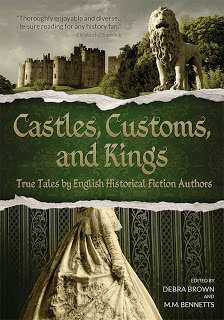 Elizabeth Chadwick said, "I think this will appeal to people across the board. It’ll make a perfect stocking filler for history buffs for Christmas. It’s companionable to read with a variety of different subjects, writing styles and approaches to history and historical research and can be dipped in and out of at leisure."
Elizabeth Chadwick said, "I think this will appeal to people across the board. It’ll make a perfect stocking filler for history buffs for Christmas. It’s companionable to read with a variety of different subjects, writing styles and approaches to history and historical research and can be dipped in and out of at leisure."Other reviewers have said:
"If you are interested in nonfiction works on England, history, and/or royalty you will find a book that you will return to."
"I found the tales of queens and kings from the historical fiction I've loved and learned to treasure just absorbing in the small bites these authors provide."
"Actually, was mesmerized by it and took it in because it's written in small vignettes. "
"There is something for everyone, and something more again and again."
"I was surprised at the distinctly 'old-fashioned' feel of much of it.... I found the approach charming and reassuring."
"Just full of information on English history...all wonderfully compiled and edited...not one single dull entry!"
Comment below to enter the drawing, and please be sure to leave your contact information. Then visit the other blogs to see what they have to offer. Enjoy the hop!
Authors wishing to join this hop can enter HERE.
Thank you for reading my blog! I am always eager to hear back from you.
Debbie Brown
Author of The Companion of Lady Holmeshire
Published on January 17, 2014 21:00
January 13, 2014
Writer's/Artist's Retreat: Y Cwtch Holiday Cottage, home of author Judith Arnopp.
As a writer I am very fortunate to live in a rural area, far from people and the distractions that go with them. One of the most common remarks I have from my fellow writers is, ‘How lucky you are to be able to write full time and in such an idyllic spot.”
 Although we advertise the annexe for holidays it has only just recently occurred to us that it would make a pleasant ‘private retreat’ for writers or artists who don’t have the luxury of such surroundings every day. So we are expanding our marketing to include creative artists of all genres.
Although we advertise the annexe for holidays it has only just recently occurred to us that it would make a pleasant ‘private retreat’ for writers or artists who don’t have the luxury of such surroundings every day. So we are expanding our marketing to include creative artists of all genres.
Our home used to house six people but now the children have fledged, it is sanctuary to just two of us. On finding ourselves rattling around inside we decided to offer it as a holiday base to like-minded people, authors, artists, walkers, and wildlife enthusiasts.
 Y Cwtch (Welsh for hug) provides comfortable and competitively priced accommodation. Adjacent to the farmhouse Y Cwtch comprises of one double and one single bedroom with room for a travel cot. There is a newly fitted bathroom, a dual aspect sitting room and full equipped kitchen and separate utility.
Y Cwtch (Welsh for hug) provides comfortable and competitively priced accommodation. Adjacent to the farmhouse Y Cwtch comprises of one double and one single bedroom with room for a travel cot. There is a newly fitted bathroom, a dual aspect sitting room and full equipped kitchen and separate utility.
 Guests have full use of a private enclosed garden and are also welcome to make use of our own pretty, private grounds, although they should be aware of the possibility of bumping into us mowing or clipping. Visitors are welcome to help with the weeding should they desire to do so.
Guests have full use of a private enclosed garden and are also welcome to make use of our own pretty, private grounds, although they should be aware of the possibility of bumping into us mowing or clipping. Visitors are welcome to help with the weeding should they desire to do so.
The meadows, that face south-west, are fed by a pretty rambling stream which is teeming with wildlife. In the past the fields have been home to a range of livestock but these days just provide refuge for wildlife and a couple of elderly Welsh mountain ponies.
There are plenty of lovely spots to sit with a picnic while you write, or dream, or plot, all within sight of Llanwnni Mountain which, while it may not be the highest peak in the world, has been our personal companion for many happy years. It sleeps in the opposite valley, watching but not commenting on all that takes place below.
Y Cwtch itself lies in a pretty valley just outside the farming community of Cwrtnewydd, a short drive from the market town of Lampeter, the fabulous coastline and Newcastle Emlyn, with its many antique shops.
 It is still possible to access the historic past in Wales. There are sites ranging from ancient burial mounds, iron age hillforts, early medieval churches and castles, Tudor manor houses, 19th century stately homes and woollen mills. Many sites are admission free and it is perfectly possible to find yourself completely alone in a medieval castle within sight and sound of the sea. Perfect for absorbing the atmosphere and mind set of ‘those who lived before.’
It is still possible to access the historic past in Wales. There are sites ranging from ancient burial mounds, iron age hillforts, early medieval churches and castles, Tudor manor houses, 19th century stately homes and woollen mills. Many sites are admission free and it is perfectly possible to find yourself completely alone in a medieval castle within sight and sound of the sea. Perfect for absorbing the atmosphere and mind set of ‘those who lived before.’
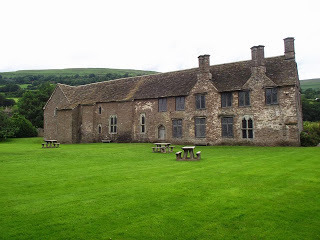 West Wales is famous for its beaches, castles and ancient churches and is within an easy drive of Pembrokeshire, Brecon and North Wales, if you can tear yourself away from Ceredigion.
West Wales is famous for its beaches, castles and ancient churches and is within an easy drive of Pembrokeshire, Brecon and North Wales, if you can tear yourself away from Ceredigion.
For more information please visit our website: http://welshholidays.webs.com/ or find us on facebook https://www.facebook.com/welshholiday
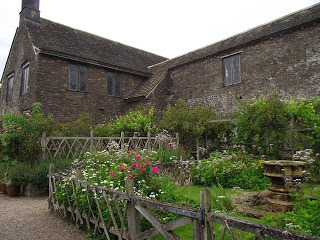

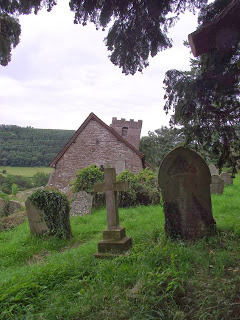


Thank you for reading my blog! I am always eager to hear back from you.
Debbie Brown
Author of The Companion of Lady Holmeshire
 Although we advertise the annexe for holidays it has only just recently occurred to us that it would make a pleasant ‘private retreat’ for writers or artists who don’t have the luxury of such surroundings every day. So we are expanding our marketing to include creative artists of all genres.
Although we advertise the annexe for holidays it has only just recently occurred to us that it would make a pleasant ‘private retreat’ for writers or artists who don’t have the luxury of such surroundings every day. So we are expanding our marketing to include creative artists of all genres.Our home used to house six people but now the children have fledged, it is sanctuary to just two of us. On finding ourselves rattling around inside we decided to offer it as a holiday base to like-minded people, authors, artists, walkers, and wildlife enthusiasts.
 Y Cwtch (Welsh for hug) provides comfortable and competitively priced accommodation. Adjacent to the farmhouse Y Cwtch comprises of one double and one single bedroom with room for a travel cot. There is a newly fitted bathroom, a dual aspect sitting room and full equipped kitchen and separate utility.
Y Cwtch (Welsh for hug) provides comfortable and competitively priced accommodation. Adjacent to the farmhouse Y Cwtch comprises of one double and one single bedroom with room for a travel cot. There is a newly fitted bathroom, a dual aspect sitting room and full equipped kitchen and separate utility.  Guests have full use of a private enclosed garden and are also welcome to make use of our own pretty, private grounds, although they should be aware of the possibility of bumping into us mowing or clipping. Visitors are welcome to help with the weeding should they desire to do so.
Guests have full use of a private enclosed garden and are also welcome to make use of our own pretty, private grounds, although they should be aware of the possibility of bumping into us mowing or clipping. Visitors are welcome to help with the weeding should they desire to do so. The meadows, that face south-west, are fed by a pretty rambling stream which is teeming with wildlife. In the past the fields have been home to a range of livestock but these days just provide refuge for wildlife and a couple of elderly Welsh mountain ponies.
There are plenty of lovely spots to sit with a picnic while you write, or dream, or plot, all within sight of Llanwnni Mountain which, while it may not be the highest peak in the world, has been our personal companion for many happy years. It sleeps in the opposite valley, watching but not commenting on all that takes place below.
Y Cwtch itself lies in a pretty valley just outside the farming community of Cwrtnewydd, a short drive from the market town of Lampeter, the fabulous coastline and Newcastle Emlyn, with its many antique shops.
 It is still possible to access the historic past in Wales. There are sites ranging from ancient burial mounds, iron age hillforts, early medieval churches and castles, Tudor manor houses, 19th century stately homes and woollen mills. Many sites are admission free and it is perfectly possible to find yourself completely alone in a medieval castle within sight and sound of the sea. Perfect for absorbing the atmosphere and mind set of ‘those who lived before.’
It is still possible to access the historic past in Wales. There are sites ranging from ancient burial mounds, iron age hillforts, early medieval churches and castles, Tudor manor houses, 19th century stately homes and woollen mills. Many sites are admission free and it is perfectly possible to find yourself completely alone in a medieval castle within sight and sound of the sea. Perfect for absorbing the atmosphere and mind set of ‘those who lived before.’ West Wales is famous for its beaches, castles and ancient churches and is within an easy drive of Pembrokeshire, Brecon and North Wales, if you can tear yourself away from Ceredigion.
West Wales is famous for its beaches, castles and ancient churches and is within an easy drive of Pembrokeshire, Brecon and North Wales, if you can tear yourself away from Ceredigion. For more information please visit our website: http://welshholidays.webs.com/ or find us on facebook https://www.facebook.com/welshholiday





Thank you for reading my blog! I am always eager to hear back from you.
Debbie Brown
Author of The Companion of Lady Holmeshire
Published on January 13, 2014 06:55
January 6, 2014
Historical Fiction Excerpt: A Newfound Land
by Anna Belfrage
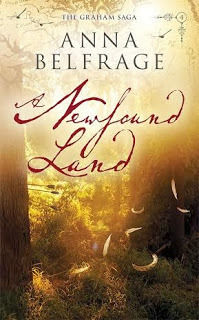 It’s 1672, and Matthew Graham and his family have left Scotland. Having taken the drastic decision to leave their homeland due to religious conflicts, Alexandra and Matthew hope for a simpler, if harsher, life in the wilds of the Colony of Maryland.
It’s 1672, and Matthew Graham and his family have left Scotland. Having taken the drastic decision to leave their homeland due to religious conflicts, Alexandra and Matthew hope for a simpler, if harsher, life in the wilds of the Colony of Maryland.
Unfortunately, things don’t always turn out as you want them to, and the past has a nasty tendency to resurface at the most inappropriate moments. Both Matthew and Alex are forced to cope with the unexpected reappearance of people they had never thought to meet again, and the screw is turned that much tighter when the four rogue Burley brothers enter their lives.
Matters are further complicated by the strained relations between colonists and the Susquehannock Indians. When Matthew intercedes to stop the Burleys from abducting Indian women into slavery he makes lifelong – and deadly – enemies of them all.
Once again Alex is plunged into an existence where death seems to threaten her man wherever he goes.
Will Matthew see himself – and his family – safe in these new circumstances? And will the past finally be laid to rest?
Excerpt
Alex recognised the horse first, gulped and tried to make herself as invisible as possible. Difficult to do when one was wearing a flowered shawl and a white cap, and with a low whoop Philip Burley brought his horse to a halt.
“Well, well, if it isn’t Mrs Graham.” His mouth stretched itself into a cold smile. “And what may you have in your apron? More of those peppers you so kindly anointed my eyes with last time we met?”
“No.” Alex succeeded in sounding much more relaxed than she felt. “These are hips.”
“Hips, you say?” Philip let his eyes travel up and down Alex.
“She has good ones,” one of his companions piped up, eliciting a snicker from the other two.
Alex looked from one to the other. “Oh my God, it’s actually true. You do have three brothers.”
“Why is that so surprising?”
Alex just shook her head. Dark-haired and light-eyed the lot of them, the youngest not much more than a boy, the other two closer to Philip in age, somewhere in their late twenties. “I was commiserating with your mother. Imagine giving birth to four like you.”
“Seven actually, but the three eldest were girls,” Philip said.
“Lucky her,” Alex muttered.
“Very,” one of the other brothers said. “Four sons to keep her well protected – unlike you, Mrs Graham.” He looked over to Philip. “Is she the wife of the man who stole the Indians from you?”
“Stole? Matthew stopped your creep of a brother from abducting them!” Alex shifted a couple of yards further away from the path, eyeing her surroundings.
“Yes, she is.” Philip rode his horse into the underbrush, and Alex retreated behind a stand of maple saplings. “Think you can run?”
“Run? Why should I? Matthew will be here any minute.”
“Really?” Philip drawled.
“Really,” Alex said, taking yet another step away from him. “What are you doing here? Aren’t you supposed to be in Virginia?”
“Our business is none of your concern,” Philip said.
“Business? Here?” Alex swept her arm at the surrounding wilderness. “What do you do? Sell nuts to the squirrels?”
Philip laughed. “There are always buyers for our goods – and services.” He turned to his brothers. “What do you reckon she’s worth?”
“Worth? Me? Why you—” Alex broke off at his look and backed into the closest bramble.
“She’s quite old,” the youngest of them said.
“Yes,” one of the others agreed. His eyes stuck to Alex’s chest, did a cursory inspection of the rest of her and returned to her chest. He had eyes as light as Philip, eyes that made her knees wobble.
“Just because she’s old it doesn’t mean we can’t sell her,” the third brother said. “Some sort of compensation for the lost Indians.”
“Just because you walk on two legs and can talk, it doesn’t follow you have a brain, does it?” Alex retorted.
“Feisty,” Philip said. “I like that in a woman. Makes it more fun to...” He made a rude gesture and his brothers grinned, eyeing Alex hungrily.
“I just told you. My husband will be here shortly.”
“Now why don’t I believe you, Mrs Graham?” Philip Burley leaned forward over the neck of his horse.
“Because you’re stupid?” Alex said.
“Stupid? I think not, Mrs Graham.” He rode closer. Alex groped for her knife and raised it high. Philip looked at her with a glimmer of admiration in his eyes. He smiled, a slow, dangerous smile further enhanced by the lock of coal-black hair that fell forward over his face. For eternal seconds, she was nailed to the spot by his eyes. The palms of her hands, the insides of her thighs broke out in a cold sweat.
Finally, he wheeled his horse. “I’ll be back,” he threw over his shoulder. “If nothing else to offer my condolences to the recently bereaved widow.”
She couldn’t help it, she gasped, making him laugh.
“We don’t have time to waste. We have a militia to join – coincidentally the same company your husband belongs to.”
“But...” the youngest whined. “I thought we’d—”
“Not today, Will,” Philip cut him off. He smiled at Alex and touched the brim of his hat. “We know where to find her when we want her.” With that he was off, his three brothers in his wake.
Alex sank down to sit where she stood.
Thank you for reading my blog! I am always eager to hear back from you.
Debbie Brown
Author of The Companion of Lady Holmeshire
 It’s 1672, and Matthew Graham and his family have left Scotland. Having taken the drastic decision to leave their homeland due to religious conflicts, Alexandra and Matthew hope for a simpler, if harsher, life in the wilds of the Colony of Maryland.
It’s 1672, and Matthew Graham and his family have left Scotland. Having taken the drastic decision to leave their homeland due to religious conflicts, Alexandra and Matthew hope for a simpler, if harsher, life in the wilds of the Colony of Maryland.Unfortunately, things don’t always turn out as you want them to, and the past has a nasty tendency to resurface at the most inappropriate moments. Both Matthew and Alex are forced to cope with the unexpected reappearance of people they had never thought to meet again, and the screw is turned that much tighter when the four rogue Burley brothers enter their lives.
Matters are further complicated by the strained relations between colonists and the Susquehannock Indians. When Matthew intercedes to stop the Burleys from abducting Indian women into slavery he makes lifelong – and deadly – enemies of them all.
Once again Alex is plunged into an existence where death seems to threaten her man wherever he goes.
Will Matthew see himself – and his family – safe in these new circumstances? And will the past finally be laid to rest?
Excerpt
Alex recognised the horse first, gulped and tried to make herself as invisible as possible. Difficult to do when one was wearing a flowered shawl and a white cap, and with a low whoop Philip Burley brought his horse to a halt.
“Well, well, if it isn’t Mrs Graham.” His mouth stretched itself into a cold smile. “And what may you have in your apron? More of those peppers you so kindly anointed my eyes with last time we met?”
“No.” Alex succeeded in sounding much more relaxed than she felt. “These are hips.”
“Hips, you say?” Philip let his eyes travel up and down Alex.
“She has good ones,” one of his companions piped up, eliciting a snicker from the other two.
Alex looked from one to the other. “Oh my God, it’s actually true. You do have three brothers.”
“Why is that so surprising?”
Alex just shook her head. Dark-haired and light-eyed the lot of them, the youngest not much more than a boy, the other two closer to Philip in age, somewhere in their late twenties. “I was commiserating with your mother. Imagine giving birth to four like you.”
“Seven actually, but the three eldest were girls,” Philip said.
“Lucky her,” Alex muttered.
“Very,” one of the other brothers said. “Four sons to keep her well protected – unlike you, Mrs Graham.” He looked over to Philip. “Is she the wife of the man who stole the Indians from you?”
“Stole? Matthew stopped your creep of a brother from abducting them!” Alex shifted a couple of yards further away from the path, eyeing her surroundings.
“Yes, she is.” Philip rode his horse into the underbrush, and Alex retreated behind a stand of maple saplings. “Think you can run?”
“Run? Why should I? Matthew will be here any minute.”
“Really?” Philip drawled.
“Really,” Alex said, taking yet another step away from him. “What are you doing here? Aren’t you supposed to be in Virginia?”
“Our business is none of your concern,” Philip said.
“Business? Here?” Alex swept her arm at the surrounding wilderness. “What do you do? Sell nuts to the squirrels?”
Philip laughed. “There are always buyers for our goods – and services.” He turned to his brothers. “What do you reckon she’s worth?”
“Worth? Me? Why you—” Alex broke off at his look and backed into the closest bramble.
“She’s quite old,” the youngest of them said.
“Yes,” one of the others agreed. His eyes stuck to Alex’s chest, did a cursory inspection of the rest of her and returned to her chest. He had eyes as light as Philip, eyes that made her knees wobble.
“Just because she’s old it doesn’t mean we can’t sell her,” the third brother said. “Some sort of compensation for the lost Indians.”
“Just because you walk on two legs and can talk, it doesn’t follow you have a brain, does it?” Alex retorted.
“Feisty,” Philip said. “I like that in a woman. Makes it more fun to...” He made a rude gesture and his brothers grinned, eyeing Alex hungrily.
“I just told you. My husband will be here shortly.”
“Now why don’t I believe you, Mrs Graham?” Philip Burley leaned forward over the neck of his horse.
“Because you’re stupid?” Alex said.
“Stupid? I think not, Mrs Graham.” He rode closer. Alex groped for her knife and raised it high. Philip looked at her with a glimmer of admiration in his eyes. He smiled, a slow, dangerous smile further enhanced by the lock of coal-black hair that fell forward over his face. For eternal seconds, she was nailed to the spot by his eyes. The palms of her hands, the insides of her thighs broke out in a cold sweat.
Finally, he wheeled his horse. “I’ll be back,” he threw over his shoulder. “If nothing else to offer my condolences to the recently bereaved widow.”
She couldn’t help it, she gasped, making him laugh.
“We don’t have time to waste. We have a militia to join – coincidentally the same company your husband belongs to.”
“But...” the youngest whined. “I thought we’d—”
“Not today, Will,” Philip cut him off. He smiled at Alex and touched the brim of his hat. “We know where to find her when we want her.” With that he was off, his three brothers in his wake.
Alex sank down to sit where she stood.
Thank you for reading my blog! I am always eager to hear back from you.
Debbie Brown
Author of The Companion of Lady Holmeshire
Published on January 06, 2014 00:00
January 2, 2014
Living Like Elizabeth Bennet
by Kaelyn Caldwell
I was introduced to Jane Austen late in life, despite having been an English major in college. Years later, I encountered the BBC/A&E Pride and Prejudice miniseries. I was hooked! I became enamored with the language of Jane Austen (such literate and insightful repartee) and the lifestyle of Elizabeth Bennet (with enough stay-at-home leisure to allow for appealing pastimes and fruitful reflection).
As I watched the miniseries (again and again and again), I continued to ask myself: “What is it about Austen’s fictionalized world that is so captivating?” Finally … the answer came: I began to see that there were aspects of Elizabeth Bennet’s life that were missing from my own, i.e., lots of time spent outdoors, pleasurable home-based hobbies, carefully constructed correspondence … and etc.
Ultimately, I distilled Elizabeth Bennet’s life into two overarching themes: She was circumspect (thoughtful), and her life was circumscribed (lived close to home). It was then that I realized I could translate Elizabeth’s 19th-century lifestyle into guidelines that could work for me in the 21st century, helping me embrace a more intentioned and simpler way of life.
Two ideas guided me:
1. Slow down. Almost everything I admire about Elizabeth Bennet has to do with the fact that she takes time to think about her life and the lives of others. She is not on fast forward; instead, she seeks out spaces of time to be by herself (or in the steadying company of her older sister, wiser aunt or other thoughtful companions), giving Elizabeth the opportunity to process her life’s events. Additionally, in the slowed-down-pace of Pride and Prejudice, there were lapses of time between letters or even between a next encounter, which allowed our heroine time to reassess and reconsider before moving forward, often with a wiser, more seasoned point of view. I began to see that slowing down could foster wisdom.
2. Live small. Much has been written about the fact that Jane Austen’s life was very narrow …and yet, her appeal is wider than ever. How can it be that a 19th-century rector’s daughter – who never traveled much beyond the place she was born – could put forth such universal perspectives about life? Fortunately for her 21st-century fans, Austen was able “to see the world in a grain of sand.” She didn’t need to travel the world to understand it; instead, Austen looked at her own life, figured out its universalities, and expressed them. That these existed within a Regency context is less important than Austen’s ability to tap into a vision that is accessible to all, and for all times. Through her eyes, I began to see that a narrower existence – less running around, fewer errands, even vacations spent closer to home – could expand my understanding of the world, not shrink it.
By examining the circumspect pace and circumscribed place of Pride and Prejudice, I realized that slowing down and living small could afford me the riches of a more Elizabeth Bennet way of life.
__________________
Kaelyn Caldwell is the author of How to Speak Like Jane Austen and Live Like Elizabeth Bennet, A Pride and Prejudice Primer: Your Guide to Livelier Language and a Lovelier Lifestyle. Visit her website at www.austenandbennet.com.
Thank you for reading my blog! I am always eager to hear back from you.
Debbie Brown
Author of The Companion of Lady Holmeshire
I was introduced to Jane Austen late in life, despite having been an English major in college. Years later, I encountered the BBC/A&E Pride and Prejudice miniseries. I was hooked! I became enamored with the language of Jane Austen (such literate and insightful repartee) and the lifestyle of Elizabeth Bennet (with enough stay-at-home leisure to allow for appealing pastimes and fruitful reflection).
As I watched the miniseries (again and again and again), I continued to ask myself: “What is it about Austen’s fictionalized world that is so captivating?” Finally … the answer came: I began to see that there were aspects of Elizabeth Bennet’s life that were missing from my own, i.e., lots of time spent outdoors, pleasurable home-based hobbies, carefully constructed correspondence … and etc.
Ultimately, I distilled Elizabeth Bennet’s life into two overarching themes: She was circumspect (thoughtful), and her life was circumscribed (lived close to home). It was then that I realized I could translate Elizabeth’s 19th-century lifestyle into guidelines that could work for me in the 21st century, helping me embrace a more intentioned and simpler way of life.
Two ideas guided me:
1. Slow down. Almost everything I admire about Elizabeth Bennet has to do with the fact that she takes time to think about her life and the lives of others. She is not on fast forward; instead, she seeks out spaces of time to be by herself (or in the steadying company of her older sister, wiser aunt or other thoughtful companions), giving Elizabeth the opportunity to process her life’s events. Additionally, in the slowed-down-pace of Pride and Prejudice, there were lapses of time between letters or even between a next encounter, which allowed our heroine time to reassess and reconsider before moving forward, often with a wiser, more seasoned point of view. I began to see that slowing down could foster wisdom.
2. Live small. Much has been written about the fact that Jane Austen’s life was very narrow …and yet, her appeal is wider than ever. How can it be that a 19th-century rector’s daughter – who never traveled much beyond the place she was born – could put forth such universal perspectives about life? Fortunately for her 21st-century fans, Austen was able “to see the world in a grain of sand.” She didn’t need to travel the world to understand it; instead, Austen looked at her own life, figured out its universalities, and expressed them. That these existed within a Regency context is less important than Austen’s ability to tap into a vision that is accessible to all, and for all times. Through her eyes, I began to see that a narrower existence – less running around, fewer errands, even vacations spent closer to home – could expand my understanding of the world, not shrink it.
By examining the circumspect pace and circumscribed place of Pride and Prejudice, I realized that slowing down and living small could afford me the riches of a more Elizabeth Bennet way of life.
__________________
Kaelyn Caldwell is the author of How to Speak Like Jane Austen and Live Like Elizabeth Bennet, A Pride and Prejudice Primer: Your Guide to Livelier Language and a Lovelier Lifestyle. Visit her website at www.austenandbennet.com.
Thank you for reading my blog! I am always eager to hear back from you.
Debbie Brown
Author of The Companion of Lady Holmeshire
Published on January 02, 2014 00:31
December 20, 2013
Casting Light Upon the Darkness
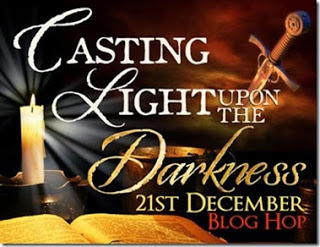 designed by www.avalongraphics.org
designed by www.avalongraphics.orgForgive, please, but I've had to drop out of this hop; a wedding decided to happen in the family as well as computer problems, and you know how that goes.
Please catch the list of blogs at Helen Hollick's page.
Thanks, and may the shortest day of your Northern year be full of light and good cheer!
Thank you for reading my blog! I am always eager to hear back from you.
Debbie Brown
Author of The Companion of Lady Holmeshire
Published on December 20, 2013 15:12



